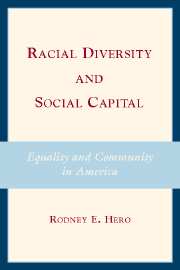Book contents
- Frontmatter
- Contents
- List of Tables and Figures
- Preface
- Acknowledgments
- 1 Introduction
- 2 The Social Capital Thesis
- 3 The Racial Diversity Thesis
- 4 Examining Social Outcomes, and Civic and Economic Equality
- 5 Voter Turnout and Other Forms of Participation in Context (with Caroline Tolbert)
- 6 Public Policy Outputs
- 7 Conclusion
- References
- Index
1 - Introduction
Published online by Cambridge University Press: 18 December 2009
- Frontmatter
- Contents
- List of Tables and Figures
- Preface
- Acknowledgments
- 1 Introduction
- 2 The Social Capital Thesis
- 3 The Racial Diversity Thesis
- 4 Examining Social Outcomes, and Civic and Economic Equality
- 5 Voter Turnout and Other Forms of Participation in Context (with Caroline Tolbert)
- 6 Public Policy Outputs
- 7 Conclusion
- References
- Index
Summary
Has America's sense of “community” been racially constrained and contingent? In other words, has American civil society, politics, and a broader collective sense of self been shaped about as much by racial and ethnic differentiation (i.e., racial/ethnic “diversity”) as by more general and supposedly inclusive conceptions of social connectedness and commonwealth, civic republicanism, or “social capital”? Do America's practices – and perhaps very understanding – of community continue to be shaped in substantial part by racial factors, even though forty years have passed since civil rights legislation was enacted? Do understandings of race affect perceptions of what are considered to be appropriate and actual community bounds, and do notions of community define and/or reinforce racial/ethnic differentiation? Beyond formal citizenship and legal guarantees of civil rights, what criteria implicitly (or explicitly) define the depth and breadth of “who really belongs”? Are the two sets of social phenomena – race and community – normatively (and actually) antithetical, symbiotic, intertwined, or related in other ways? Has scholarly research effectively acknowledged these possibilities and analyzed them accordingly? These complex and difficult questions motivate the present study.
The issues examined here certainly speak to these questions, although it is unlikely that any single study can satisfactorily grapple with the many dimensions identified. Therefore, this inquiry is somewhat more focused and asks: Has the reality been one of a civil society and a polity that is racially constrained and conditional (Hero 1998; cf. Orr 1999)?
- Type
- Chapter
- Information
- Racial Diversity and Social CapitalEquality and Community in America, pp. 1 - 19Publisher: Cambridge University PressPrint publication year: 2007



